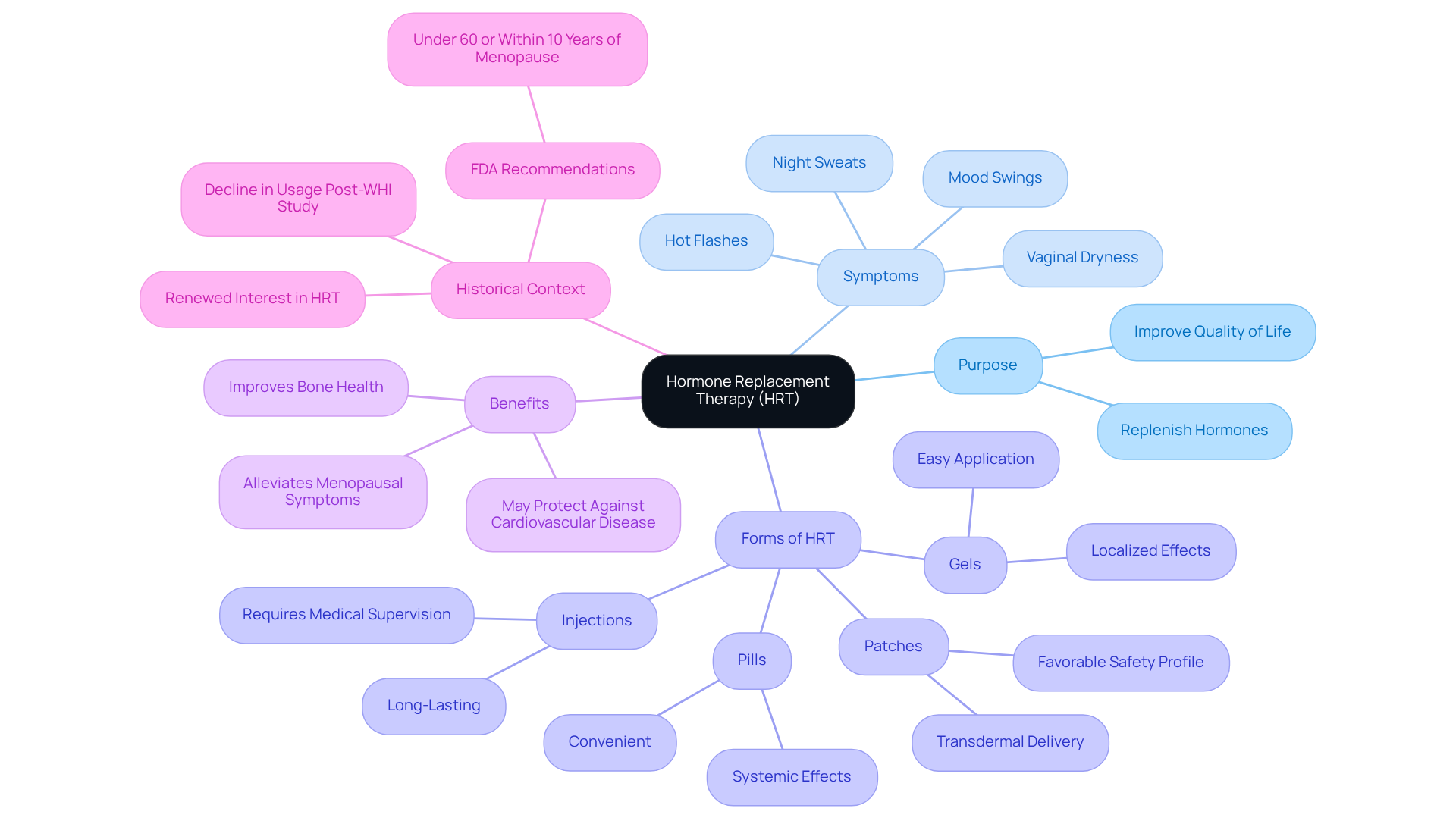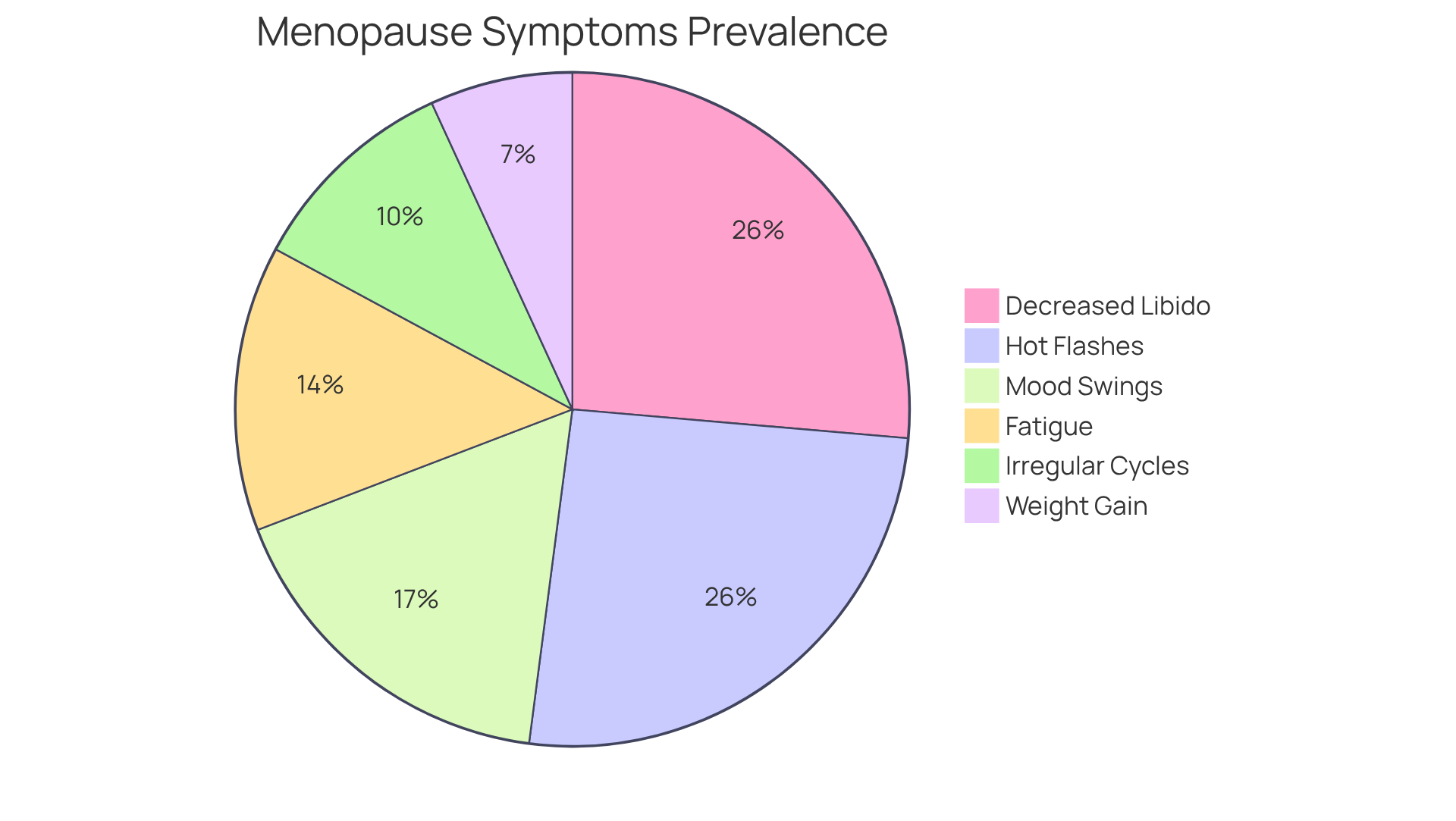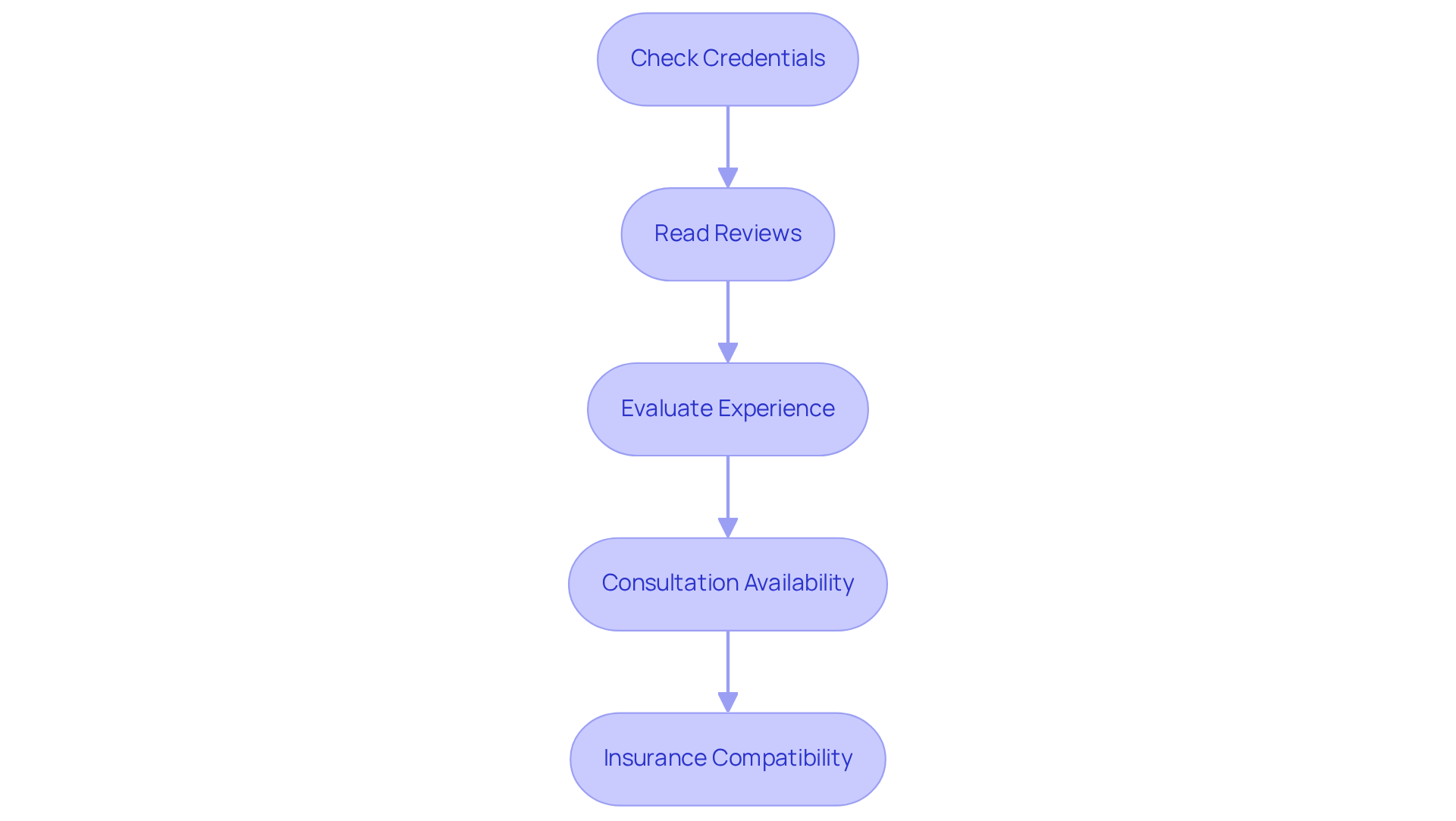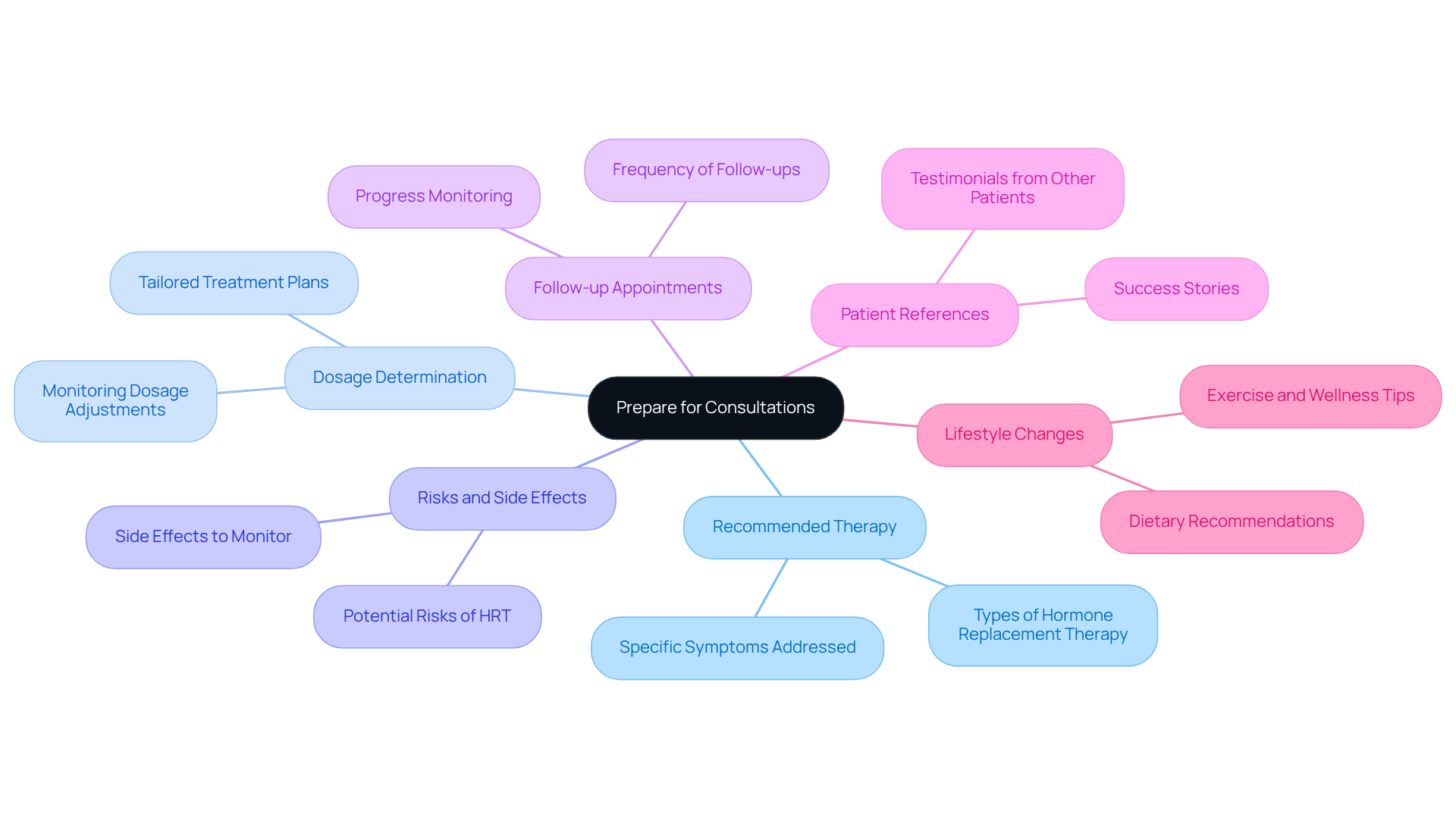Introduction
Navigating the complexities of hormone replacement therapy (HRT) can feel overwhelming, especially for those experiencing menopause symptoms. We understand that with so much information out there, it’s crucial to grasp the nuances of HRT and find a nearby hormone replacement doctor who truly gets your unique challenges. This guide is here to help you identify your personal hormonal needs, evaluate local providers, and prepare for consultations, empowering you to take control of your health.
How can you effectively navigate this journey? By seeking a qualified professional who understands your concerns, you can reclaim your well-being. Together, we can explore the steps you need to take to ensure you feel supported and informed every step of the way.
Understand Hormone Replacement Therapy Basics
Replacement therapy (HRT) is a compassionate medical intervention designed to replenish the essential hormones that often decline during menopause, particularly estrogen and progesterone. These hormones are crucial for various bodily functions, and their deficiency can lead to uncomfortable symptoms like hot flashes, night sweats, mood swings, and vaginal dryness. Recent studies show that HRT can significantly improve the quality of life for many individuals facing these challenges. Furthermore, addressing hormonal changes is vital for overall health, including thyroid function, which can also be impacted during this life stage.
At Woodlands Wellness & Cosmetic Center, we understand the unique needs of our clients and provide expert health solutions, such as hormone replacement dr near me, tailored just for you. Our comprehensive treatments promote hormonal balance, and we recommend consulting a hormone replacement dr near me for personalized hormone replacement therapy specifically designed for individuals in midlife. The forms of HRT available – pills, patches, gels, and injections – each come with their own unique benefits and considerations. For example, many prefer transdermal patches due to their favorable safety profile compared to oral forms. Importantly, the FDA has recently indicated that individuals under 60 or those within 10 years of menopause onset may safely consider HRT, as the timing of initiation is crucial for minimizing risks associated with treatment.
Despite a historical decline in HRT usage – dropping from around 25% to about 1.7% among individuals over 40 after the Women’s Health Initiative study – there’s a renewed interest in its benefits. This shift is supported by emerging research suggesting that lower doses and newer formulations may present different risk profiles than those previously studied.
Real-world experiences highlight the effectiveness of HRT in alleviating menopausal symptoms. Many individuals report significant relief from hot flashes and mood swings, greatly enhancing their overall well-being. As noted by leading endocrinologists, while HRT may not be suitable for everyone, it remains a vital option for many facing the challenges of menopause. Understanding these fundamentals empowers you to make informed decisions about your health and wellness journey. At Woodlands Wellness & Cosmetic Center, we are here to support you every step of the way.

Identify Your Hormonal Needs and Symptoms
If you’re considering hormone replacement therapy, the first step is to recognize your symptoms and understand your hormonal needs, especially when looking for a hormone replacement dr near me. Many women experience common signs of hormonal imbalance, such as:
- Hot flashes and night sweats, which affect about 75% of menopausal women.
- Mood swings or increased anxiety, reported by 50% of individuals during menopause.
- Fatigue or low energy levels that can really impact your daily life.
- Irregular menstrual cycles, often signaling the start of perimenopause.
- Weight gain or challenges in losing weight, with many noticing an average increase of one pound per year during menopause.
- Decreased libido, affecting around 77% of postmenopausal women.
Keeping a journal to track your symptoms over time can be incredibly helpful. Note how often they occur and how severe they feel. This information will be invaluable when you discuss your situation with a hormone replacement dr near me. Furthermore, engaging with a hormone replacement dr near me who specializes in menopause can assist you in creating a personalized plan that addresses your unique hormonal needs. Together, we can ensure you receive the most effective care on your wellness journey.

Research and Evaluate Local Hormone Replacement Doctors
Starting your search for a hormone replacement dr near me can feel overwhelming, but remember, you’re not alone. We understand how important it is to find a qualified provider who truly cares about your well-being. Here are some steps to guide you in this journey:
- Check Credentials: Look for board-certified endocrinologists or gynecologists who specialize in hormonal treatment. Their credentials are crucial indicators of their expertise in this field, ensuring you receive the best care possible.
- Read Reviews: Platforms like Healthgrades or Yelp can be invaluable. By gathering patient feedback, you can gain insights into the experiences of others, helping you gauge the quality of care provided.
- Evaluate Experience: Consider how long the doctor has been practicing and their specific experience with replacement therapy. A seasoned provider is likely to have a deeper understanding of the nuances involved in treatment, which can make a significant difference in your care.
- Consultation Availability: It’s essential to verify whether the doctor offers initial consultations. This meeting is a great opportunity to discuss your needs and explore potential treatment options tailored just for you.
- Insurance Compatibility: Confirm that the doctor accepts your insurance plan. This step is vital to avoid unexpected costs and ensure that your treatment is financially manageable.
By following these guidelines, you can make an informed choice when selecting a hormone replacement dr near me for your therapy. Remember, this decision is about your health and happiness. At Woodlands Wellness & Cosmetic Center, we’re here to support you every step of the way on your wellness journey.

Prepare for Consultations: Key Questions to Ask
Preparing for a consultation with a hormone replacement dr near me can feel overwhelming, but asking thoughtful questions can help clarify your treatment options and the physician’s approach. Here are some key inquiries to consider:
- What types of hormone replacement therapy do you recommend for my specific symptoms?
- How do you determine the appropriate dosage and treatment plan tailored to my needs?
- What are the potential risks and side effects associated with the suggested treatment?
- How frequently will I need follow-up appointments to monitor my progress?
- Can you provide references or testimonials from other patients who have undergone similar treatments?
- What lifestyle changes can I implement to support my hormonal health?
Taking detailed notes during your consultation can be incredibly helpful. It allows you to retain the information discussed, empowering you to make informed decisions about your health. Engaging in this conversation is crucial. Many women report significant improvements in their quality of life after starting treatment, successfully managing issues like hot flashes and night sweats. In fact, did you know that 74% of postmenopausal individuals younger than 55 experience vasomotor symptoms? Among them, 28% report moderate to severe symptoms, underscoring the importance of these discussions.
Understanding the nuances of your treatment strategy is essential, especially since consulting a hormone replacement dr near me isn’t a one-size-fits-all solution. As Dr. Taryn Smith wisely notes, “for the average healthy woman, these options are very safe.” By being proactive and informed, you can ensure that your approach to hormone replacement therapy is both safe and effective. Together, we can navigate this journey toward better hormonal health.

Conclusion
Finding the right hormone replacement doctor is a crucial step in navigating the challenges of hormonal imbalance, especially during menopause. This guide has shed light on the essential aspects of hormone replacement therapy (HRT), highlighting the importance of making informed decisions when seeking treatment. By grasping the basics of HRT, recognizing personal symptoms, and evaluating local providers, you can embark on a journey toward improved well-being and a better quality of life.
Key insights from this guide emphasize the necessity of identifying your specific hormonal needs and symptoms. It’s vital to research qualified hormone replacement doctors and prepare thoughtful questions for your consultations. Each of these components plays a significant role in ensuring that your chosen treatment aligns with your health goals and effectively addresses your unique challenges. The renewed interest in HRT, supported by emerging research and personal testimonials, underscores its potential benefits for many individuals navigating menopause.
Ultimately, taking proactive steps in this journey is essential. Engaging with a hormone replacement doctor not only enhances your understanding of treatment options but also fosters a supportive environment for managing your hormonal health. We encourage you to prioritize your well-being by seeking qualified providers, asking pertinent questions, and considering HRT as a valuable option for alleviating menopausal symptoms. The path to hormonal balance is within reach, and with the right guidance, a more comfortable and fulfilling life is attainable.
Frequently Asked Questions
What is hormone replacement therapy (HRT)?
Hormone replacement therapy (HRT) is a medical intervention designed to replenish essential hormones, particularly estrogen and progesterone, that often decline during menopause. This therapy aims to alleviate uncomfortable symptoms and improve overall quality of life.
What symptoms can HRT help alleviate?
HRT can help alleviate symptoms such as hot flashes, night sweats, mood swings, and vaginal dryness, which are commonly experienced during menopause.
Why is addressing hormonal changes important during menopause?
Addressing hormonal changes during menopause is vital for overall health, including the function of the thyroid, which can also be affected during this life stage.
What forms of HRT are available?
The forms of HRT available include pills, patches, gels, and injections, each with unique benefits and considerations.
What are the benefits of using transdermal patches for HRT?
Many individuals prefer transdermal patches due to their favorable safety profile compared to oral forms of HRT.
Who may safely consider HRT according to the FDA?
The FDA indicates that individuals under 60 or those within 10 years of menopause onset may safely consider HRT, as the timing of initiation is crucial for minimizing risks.
What has caused the decline in HRT usage historically?
HRT usage declined significantly after the Women’s Health Initiative study, dropping from around 25% to about 1.7% among individuals over 40.
Is there a renewed interest in HRT?
Yes, there is a renewed interest in HRT, supported by emerging research suggesting that lower doses and newer formulations may present different risk profiles than those previously studied.
What real-world experiences have individuals reported regarding HRT?
Many individuals report significant relief from menopausal symptoms such as hot flashes and mood swings, greatly enhancing their overall well-being.
Is HRT suitable for everyone?
While HRT may not be suitable for everyone, it remains a vital option for many individuals facing the challenges of menopause.



